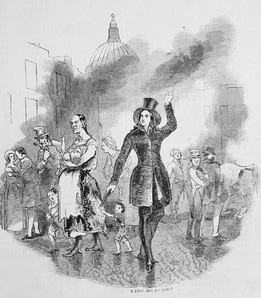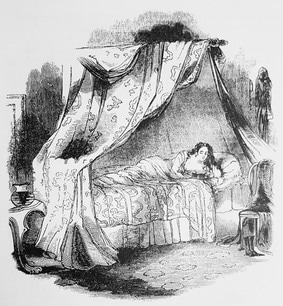 Stephen is completing his PhD at Leeds Trinity University in West Yorkshire, UK. Stephen is interested in all aspects of 18th- and 19th-century social and cultural history, although his research has led him into a few areas of focus, in particular the history of crime, criminal biography. His PhD thesis, however, examines 18th- and 19th-century literary representations of Robin Hood. Last year, Stephen “discovered” a forgotten 18th-century Robin Hood text. This “discovery” has been featured in several newspapers worldwide. His book on Wat Tyler is forthcoming with Pen and Sword publishing. You can follow him at @sbasdeo1 Introduction George William MacArthur Reynolds’ masterpiece crime novel, The Mysteries of London, serialised between 1844 and 1848, was the biggest-selling of the Victorian era. He was a prolific novelist, and throughout his long career authored over thirty novels, as well as serving as the editor of Reynolds’ Newspaper and Reynolds’ Miscellany. All of the novels and magazines that he authored were sold for a penny, and were easily within the reach of the literate middle classes, as well as some of the more affluent members of the working classes. His stories struck a chord with readers because they were politically radical. They were also sensational, with all of the master villains in each tale usually being high born, and showed the aristocracy in a scandal-ridden light. Along with this, there were healthy doses of violence.  [Images are taken from original copies of Reynolds’ work in Stephen Basdeo’s personal collection] [Images are taken from original copies of Reynolds’ work in Stephen Basdeo’s personal collection] Lady Cecilia and Vicar Reginald Tracey In a story which contains numerous subplots, one of the more interesting threads running through The Mysteries of London is the story of Lady Cecilia Harborough and the initially good and virtuous vicar, Reginald Tracey. Cecilia, an aristocrat, is one of the most immoral characters in the novel (immoral by Victorian standards at least). She is skilled in seducing men with her feminine wiles, and eventually she sets her sights upon Reginald. When the pair first meets there is not an ounce of immorality in Reginald’s character, but eventually she charms him. Cecilia invites Reginald to her house when she is alone, and he becomes increasingly infatuated with her, and the two begin an illicit relationship. From that moment forth, Reynolds writes: He now became an accomplished hypocrite. He ascended the pulpit as usual, and charmed thousands with his discourse as heretofore. Indeed his eloquence improved, for the simulated earnestness which displaced the tone of heart-felt conviction that he had once experienced, seemed more impassioned, and was more impressive than the natural ebullition of his feelings. Thus as he progressed in the ways of vice, his reputation increased in sanctity. But the moment he escaped from the duties of his profession, he flew to the arms of her who had seduced him from his career of purity […] so infatuated was he with her who had been his tutoress in the ways of amorous pleasure.[i] Thus, he fully surrenders himself to the ways of sin and vice, and to maintain a veneer of respectability, after having been guilty of premarital sex on several occasions the pair are soon married. He is now a fully-fledged member of the aristocracy and a corrupt clergyman. Yet his sinful and lustful nature having been released by Cecilia, he soon tires of her and begins to seek out new forms of pleasure. One day while visiting Richard Markham’s house (the hero of the novel), the door of the bathroom has been left slightly open. Inside the bathroom, he spies the virtuous Ellen Monroe getting ready to take a bath: Without a moment's hesitation he stole softly from the recess where he had concealed himself, and approached the door of the bath-room. His greedy eyes were applied to the key-hole; and his licentious glance plunged into the depths of that sacred privacy […] Reginald watched her proceedings with the most ardent curiosity: the very luxury of the unhallowed enjoyment which he experienced caused an oppression at his chest; his heart beat quickly; his brain seemed to throb with violence. The fires of gross sensuality raged madly in his breast. Ellen's preparations were now completed. With her charming white hand she put back her hair from her forehead […] with her right hand she loosened the strings which closed her dressing-gown round the neck and the band which confined it at the waist. While thus occupied, she was partly turned towards the door; and all the treasures of her bosom were revealed to the ardent gaze of the rector.[ii] The ‘throbbing’ and ‘oppression’ in his chest is likely to be a euphemism for masturbation. His desire for another for another woman has led him to commit ‘the solitary vice’. The ‘disorder’ was explained in the following terms by R. and L. Perry in a book entitled The Silent Friend: A Medical Work on the Disorders Produced by the Dangerous Effects of Onanism (1847), which was published shortly after Reynolds was writing: The practice of the solitary vice, onanism, manustupration or masturbation has been condemned by all writers, whether medical men, philosophers, or divines, from the earliest ages of mankind. One of its names, onanism, is derived from the saddening example of Onan the second son of Judah, who was struck dead by his Creator for the commission of this heinous sin.[iii] In another medical textbook entitled The Secret Companion: A Medical Work on Onanism or Self-Pollution (1845), published just a year before Reynolds was writing this chapter, the effects of the sin of masturbation, or ‘self-pollution’ were laid bare: Sages and moral writers of every age, have described in glowing terms the direful and awful result of Masturbation a passion that captivates the imagination of its victim imperceptibly, step by step, till every moral feeling is obliterated, and all the physical powers destroyed.[iv] Reginald Tracey has thus reached the highest depths of depravity. He has been infected by with this vice by a member of the aristocracy. While watching Ellen, Tracey’s passions go on to consume him, and he even contemplates committing sexual assault:  [Images are taken from original copies of Reynolds’ work in Stephen Basdeo’s personal collection] [Images are taken from original copies of Reynolds’ work in Stephen Basdeo’s personal collection] His desires were now inflamed to that pitch when they almost become ungovernable. He felt that could he possess that charming creature, he would care not for the result — even though she be forced to compliance with his wishes, and murder and suicide followed […] He was about to grasp the handle of the door, when he remembered that he had heard the key turn in the lock immediately after she had entered the room. He gnashed his teeth with rage […] He could have broken down the door, had he not feared to alarm the other inmates of the house. He literally trembled under the Influence of his fierce desires. […] "My God!" he exclaimed, at length, "I shall grow mad under the influence of this fascination! One kiss from her lips were worth ten thousand of the meretricious embraces which Cecilia yields so willingly.[v] Yet there is not a pleasant end to the vicar’s indulgence of his inherent lustful desires. Committing small vices such as masturbation and leading a dissolute life meant that, inevitably, larger crimes would follow. This is exactly what happens to the once good vicar. His housekeeper, the kindly Mrs. Kenrick, knows all about the vicar’s sins, and one night she dies in very suspicious circumstances. The doctor concludes that she has been poisoned. The vicar attempts to deflect the blame for the crime on to another of his servants, but, as the old adage goes: Murder will out. The vicar is found out, placed on trial, while he is in the condemned cell, he muses upon the path that his life has taken: “Fool — madman that I have been!" he exclaimed aloud, in a piercing tone of despair. "From what a brilliant position have I fallen! Wealth — pleasure — fame-love-life, all about to pass away! The entire fabric destroyed by my own hands! Oh! wretch — senseless idiot — miserable fool”.[vi] As he is thus wallowing in self-pity, the old temptress, Cecilia, comes to visit him in his cell. Out of pity, she gives him a phial of poison in order to spare him the agonies of the scaffold. Alone in his cell on the evening before his execution: He raised the phial to hit lips, and swallowed the contents — greedy of every drop. In a few seconds he fell from his chair — a heavy, lifeless mass — upon the floor of the dungeon.[vii] The message (one of the many moral messages to be taken from Reynolds’ masterpiece) is clear: a criminal course of life is something that has small beginnings; committing adultery, and satisfying one’s ‘unhallowed’ desires, gradually, leads on to ever bolder offences. Even the most virtuous member of society can, if they allow themselves to succumb to these sinful thoughts, descend from the ways of virtue and into vice. Once one allows themselves to commit small sins, the floodgates are opened to ever greater ones. [i] G. W. M. Reynolds, The Mysteries of London 2 Vols. (London: G. Vickers, 1846), 1: 396. [ii] Reynolds, The Mysteries of London, 2: 27. [iii] R. & L. Perry, The Silent Friend: A Medical Work on the Disorders Produced by the Dangerous Effects of Onanism (London, 1847) [cited at Mimi Matthews’ Website https://mimimatthews.com/2016/05/17/the-solitary-vice-victorian-views-on-masturbation/] [iv] Ibid. [v] Reynolds, The Mysteries of London, 2: 27. [vi] Reynolds, The Mysteries of London, 2: 63. [vii] Reynolds, The Mysteries of London, 2: 64.
3 Comments
Brian McInnis
3/6/2017 01:20:43 pm
The 'oppression at his chest' has no symbolic similarity to masturbation and is clarified immediately: 'his heart beat quickly.'
Reply
He's staring through a keyhole at a beautiful woman. Obviously Reynolds couldn't say outright that the guy was knocking one out, but on reading the whole scene, as well as being acquainted with Tracy's descent into vicious ways, makes it difficult to argue that he wasn't. Feel free to publish a response however.
Reply
Leave a Reply. |
Sex History ContentsIf you would like to submit an article, please fill out a submission on the Contact page Archives
September 2020
|
 RSS Feed
RSS Feed